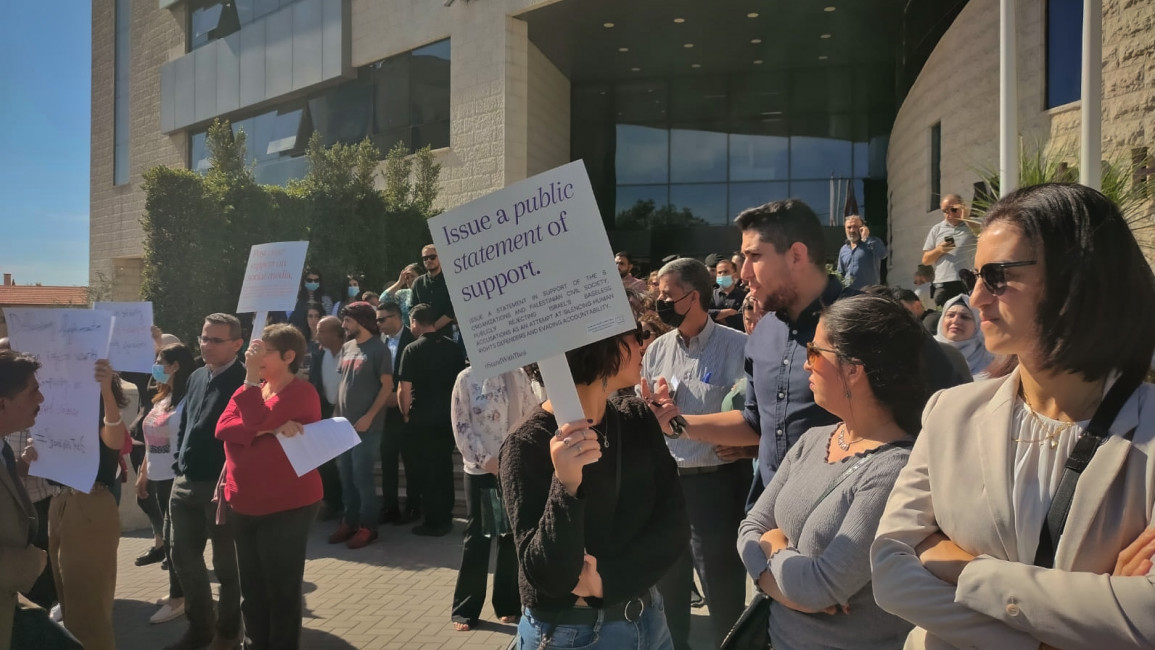Palestinians rally in support of six NGOs branded 'terrorist' by Israel
Dozens of Palestinians rallied in Ramallah and Gaza on Wednesday to protest against Israel's designation of six Palestinian NGOs as ‘terrorist’ organisations.
The rally was organised by employees of the six NGOs and was attended by a number of their beneficiaries and other civil society actors. Demonstrators held signs and chanted slogans condemning the Israeli ‘terrorist’ designation and demanding international protection to the NGOs and their staff.
شاهد| مراسلنا: وقفة احتجاجية للمؤسسات الأهلية في رام الله، تنديدًا بوسمها بـ"الإرهـــاب". pic.twitter.com/sWggwqVTv0
— شبكة قدس الإخبارية (@qudsn) November 10, 2021
In Ramallah, the protest was held in front of the UN offices. Ubai Aboudi, head of the Bisan research centre, one of the six NGOs, told The New Arab that “this rally came to protest the Israeli attack on the Palestinian civil society and to call upon the international community to assume its responsibility in protecting it”.
Aboudi added that “we decided to rally in front of the UN offices because the UN is an international body that represents the international community and because it has the resources and the capacity of protecting the Palestinian society, which is facing an attempt to silence it and suppress it”.
صور: وقفة في مدينة غزة، استنكارًا لوسم الاحتلال مؤسسات مدنية وحقوقية بالإرهـــاب.
— شبكة قدس الإخبارية (@qudsn) November 10, 2021
تصوير: عائد بكر pic.twitter.com/k3RCPbgWzb
"If they shut down no one will be left to raise our voice"
Tareq Othman, a 62-year-old farmer from a village East of Ramallah, who participated in the Ramallah rally, told The New Arab that “we came to stand by the six organisations, especially the Union of Agricultural Work Committees - UAWC, because it’s one of the most important organisations working with land workers on the ground”.
“Othman pointed out that “UAWC helps us with seeds, expertise, linking us with land workers' unions around the world and with actual presence on the ground, especially during the olive harvest season, when we are subject to Israeli settler attacks''.
Eman Nafea, the wife of Palestinian prisoner Nael Barghouthi, was also among participants.
“I came to stand by the Palestinian NGOs, especially Addameer prisoner support association, who gives legal assistance to political prisoners and advocates on their behalf in front of international institutions”, Nafea told The New Arab.
Barghouthi was released in the 2012 prisoner swap between Israel and Hamas, after three decades in prison. He was re-arrested by Israeli forces in 2014 and in 2017, when an Israeli court reactivated his life sentence.
“Addameer visited my husband and checked his life conditions for many years” highlighted Nafea. "Then Addameer organised an international campaign against the reactivation of my husband's sentence”. According to Nafea, “if these organisations are forced to shut down, there will be no one left to take our voices to international bodies and defend our cases”.
Two weeks ago the criminalisation of 6 prominent Palestinian NGOs was announced by the Israeli Ministry of Defence. Today the Israeli army issues a statement extending this criminalisation to the West Bank, opening the door for the Israeli army to go in full force. #standwiththe6
— Dr. Yara Hawari د. يارا هواري (@yarahawari) November 7, 2021
International criticism
The Israeli defence minister labelled six Palestinian NGOs as ‘terrorist’ in late October. Last week, the Israeli army issued a military order effectively banning the six NGOs. Human Rights Watch and Amnesty International condemned the move in a joint statement, calling it “an attack by the Israeli government on the international human rights movement”, and considering that “decades-long failure of the international community to challenge grave Israeli human rights abuses and impose meaningful consequences for them has emboldened Israeli authorities to act in this brazen manner”.
"To date, none of the UN agencies nor Association of International Development Agencies (AIDA) organizations have received written documentation which could serve as a basis for the allegations” https://t.co/rEnhG7Jbu7
— Khaled Elgindy (@elgindy_) November 10, 2021
Israeli human rights organisations also condemned the Israeli government’s act, calling it “an act of cowardice, characteristic of repressive, authoritarian governments”. The decision also received criticism by some Israeli officials. The labelling was also criticised by UN experts, the Irish foreign minister and by progressive US lawmakers, including Ilhan Omar, Rashida Talib and Betty McCollum.




